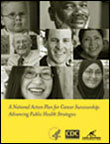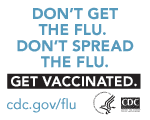CDC Features
Current Features
Cancer Survivorship Today

In the month of June we focus attention on the needs of cancer survivors. Because of advances in the early detection and treatment of cancer, people are living many years after a diagnosis. The number of survivors has been increasing steadily. Currently, there are more than 11 million Americans living with a previously diagnosed cancer, a dramatic increase from the 1971 estimate of three million persons living with cancer. [1,2]

As the population of cancer survivors continues to increase, the public health community endeavors to address the issues related to survivorship. CDC is working with national, state, and local partners to create and implement successful strategies to help the millions of people in the United States who live with, through, and beyond cancer. The term "cancer survivors" refers to individuals who have been diagnosed with cancer and those people in their lives who are affected by the diagnosis, including family members, friends, and caregivers.
Today, approximately 65% of people diagnosed with cancer are expected to live at least 5 years after diagnosis. [2] Disparities in health care, however, impact survival and low-income men and women who have inadequate or no health insurance coverage are more likely to be diagnosed with cancer at later stages, when survival times are shorter.[3]
Important Cancer Survivorship Resources
CDC is involved in research and programmatic activities related to cancer survivorship. The National Action Plan for Cancer Survivorship [4], developed in partnership between CDC and the Lance Armstrong Foundation (LAF) and multiple partners, identified public health domains, goals, prioritized needs, and objectives important for addressing the concerns of cancer survivors. See A National Action Plan for Cancer Survivorship: Advancing Public Health Strategies for more information.
Additionally, in the past 5 years, other national publications have highlighted the importance of survivorship and healthcare needs of survivors:
• Childhood Cancer Survivorship: Improving Care and Quality of Life*
• Meeting the Psychosocial Needs of Women with Breast Cancer*
• From Cancer Patient to Cancer Survivor: Lost in Transition*
• Cancer Care for the Whole Patient: Meeting Psychosocial Healthcare Needs*
• Patient-Centered Communication in Cancer Care
Public health professionals are striving to address survivorship issues such as coordinating care after completing treatment, patient-provider communication, palliative care, pain management, and fertility preservation. In light of these concerns, public health initiatives aimed at understanding and preventing secondary disease, recurrence, and long-term effects of treatment and improving survivors' quality of life are essential.
What CDC is Doing
CDC Research Initiatives
Currently CDC researchers are involved in the following research activities related to cancer survivorship:

• Adding cancer survivorship-related questions to national, population-based surveys such as the Behavioral Risk Factor Surveillance Survey and the National Health Interview Survey. These items will allow for cancer prevalence estimates at the state level and better assessment of issues and trends related to cancer survivorship.
• Surveying 5-year colorectal cancer survivors to assess survivors' compliance with public health recommendations for screening and prevention behaviors after cancer, and examine sociodemographic, physical, and psychosocial barriers to compliance with such recommendations.
• Assessing longitudinal quality of life related to men's choice of prostate cancer treatment with Fred Hutchinson Cancer Research Center, University of Southern California, University of Texas Health Science Center at San Antonio, and Medical University of South Carolina.
• Evaluating the effectiveness of a nationally available survivorship program on quality of life, decision-making, attitude, and perceived need for information among a disadvantaged population with University of Alabama-Birmingham.
• Collaborating with researchers at the American Cancer Society (ACS) to examine lifestyle changes made by cancer survivors 2, 6, and 11 years after a cancer diagnosis. We are investigating the types of changes that are made and whether such changes are associated with certain demographic, illness-related, and psychosocial characteristics.
CDC Programs and Partnerships
Other collaborative efforts related to cancer survivorship include the following:

• Working with states/tribes/territories, the National Breast and Cervical Cancer Early Detection Program (NBCCEDP) seeks to save lives by providing cancer treatment, counseling, and support services to women diagnosed with breast or cervical cancer, throughout their entire treatment period. Support and counseling services for the clients' families are also offered within each NBCCEDP program.
• Funding to Community Media Productions. This grantee won both an Emmy in 2007 and the LIVESTRONG Award of Excellence in 2008 for the PBS film A Lion in the House. Post production, the grantee works towards enhancing awareness, services, and research for pediatric and young adult cancer survivors, their families, caregivers, and the medical community.
• Supporting the development and distribution of a broad range of cancer survivorship information to many priority populations groups through the LIVESTRONG National Cancer Survivorship Resource Center. These materials help cancer survivors, their family members, friends, and caregivers understand and address the physical, emotional, and practical issues that may arise after a cancer diagnosis.
• Funding nine national organizations to develop and share information that will enhance the quality of life and knowledge about hematologic cancers for cancer survivors, family members, caregivers, and the medical community. More information on hematologic cancer survivorship is available at What CDC Is Doing.
• Collaborating with ACS, LAF, and the National Cancer Institute in dissemination of Proceedings from the Fourth Biennial Cancer Survivorship Research Conference, to be held from June 18–20, 2008 in Atlanta, Georgia. The conference will highlight research and programs pertaining to survivors, caregivers, and health care providers, as well as act as a springboard for mapping future directions in cancer science. See the conference Web site* for registration information.
• Ensuring that fertility preservation among cancer survivors is recognized by participating in a CDC-wide effort to define the role of public health in preventing, detecting, and managing infertility. The National Action Plan for Cancer Survivorship serves as a template for an upcoming CDC-authored document addressing infertility as a public health issue.
• Funding to the Asian & Pacific Islander American Health Forum (APIAHF) for a 5-year period to support the APIAHF's Asian-American and Pacific Islander (AAPI) Cancer Survivors Capacity Building Project. The project will improve cancer prevention, early detection, and survivorship among the AAPI population. The APIAHF will host the Asian American, Native Hawaiian, and Pacific Islander Cancer Survivorship Conference: Dispelling Myths, Reducing Disparities and Providing Hope from July 22–24, 2008 in San Francisco, California. See the conference Web site* for registration information.
• Supporting many state/tribe/territory and Pacific Island jurisdictions that are actively engaged in comprehensive survivorship activities in their region. Goals and objectives related to survivorship such as quality care and palliative care are included in cancer plans. See CancerPlan.org* for more information.
• For more information about CDC's collaboration with numerous cancer survivorship partners, see Survivorship Resources.
What YOU Can Do
• Get involved in activities within your community. You may find more information at the LIVESTRONG*, National Cancer Survivorship Day*, and state/tribe/territory Comprehensive Cancer Control (CCC) Program Web sites.
• Continue taking care of your health—refrain from smoking, eat healthy, stay active, and go for appropriate follow-up care and screenings.
1. Centers for Disease Control and Prevention. Cancer Survivorship—United States 1971–2001. MMWR 2004:53:526-529.
2. Ries LAG, Melbert D, Krapcho M, Stinchcomb DG, Howlader N, Horner MJ, Mariotto A, Miller BA, Feuer EJ, Altekruse SF, Lewis DR, Clegg L, Eisner MP, Reichman M, Edwards BK (eds). SEER Cancer Statistics Review, 1975-2005, National Cancer Institute. Bethesda, MD, http://seer.cancer.gov/csr/1975_2005, based on November 2007 SEER data submission, posted to the SEER Web site, 2008.
3. Schwartz KL, Crossley-May H, Vigneau FD, Brown K, Banerjee M. Race, socioeconomic status and stage at diagnosis for five common malignancies. Cancer Causes & Control 2003;14(8):761–766.
4. Lance Armstrong Foundation and Centers for Disease Control and Prevention (2004). A National Action Plan for Cancer Survivorship: Advancing Public Health Strategies. Atlanta, GA: U.S. Department of Health and Human Services, Centers for Disease Control and Prevention.
Page last updated: June 2, 2008
Content source: Division of Cancer Prevention and Control, National Center for Chronic Disease Prevention and Health Promotion, Cancer Survivorship
Content owner: National Center for Health Marketing
URL for this page: www.cdc.gov/Features/CancerSurvivors
*Links to non-federal organizations are provided solely as a service to our users. These links do not constitute an endorsement of these organizations or their programs by CDC or the federal government, and none should be inferred. CDC is not responsible for the content of the individual organization Web pages found at these links.




